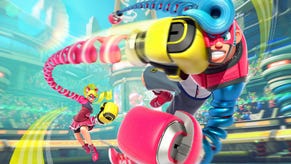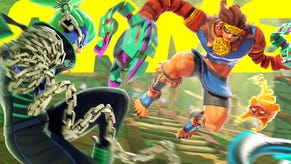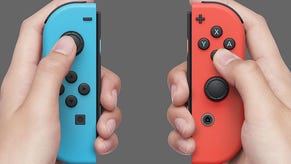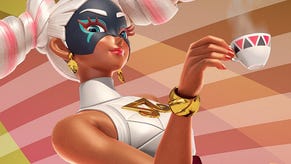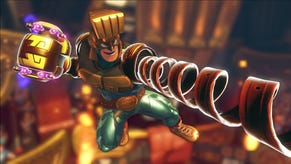Nintendo on the Challenge of Post-Release Support, and More Tales of Arms’ Development
INTERVIEW | We sat down with Arms producer Kosuke Yabuki to learn the ins-and-outs of Nintendo's unique fighter, and its busy debut year so far.
This article first appeared on USgamer, a partner publication of VG247. Some content, such as this article, has been migrated to VG247 for posterity after USgamer's closure - but it has not been edited or further vetted by the VG247 team.
When Nintendo's non-traditional fighting game Arms first swung some fists onto the scene last June, it was notably barren around launch. Yet as the year's gone on, balances have been tweaked, button mapping has been added, a Splatfest-like "Party Crash" mode joins the game for limited time events, collectible achievement-like badges for "Badge Stash" have been implemented, and with all that, new fighters, stages, and equippable arms have also joined the roster. Arms, as Nintendo recently held the US & Canada Online Open Tournament, is finally finding its legs.
A couple weeks ago at the Game Developer's Conference, we had a chance to sit down with Nintendo's Kosuke Yabuki, producer of Arms and the more recent entries of the Mario Kart series. Juggling two very different series in two very different genres has been a challenge for Yabuki, but it hasn't slowed down his spirit.
At his core, Yabuki's not just a producer of Arms, but a big fan of it too. From his favorite characters in the game (which are Spring Man and Min Min—particularly the latter's fire boomerang and the heavier megawatt as an arms combo) to the cross-cultural exchanges from other Nintendo regions that helped Twintelle come to be, Yabuki talked to us at length about Nintendo's busy year "leveling up" Arms, and where the colorful fighter is headed next.
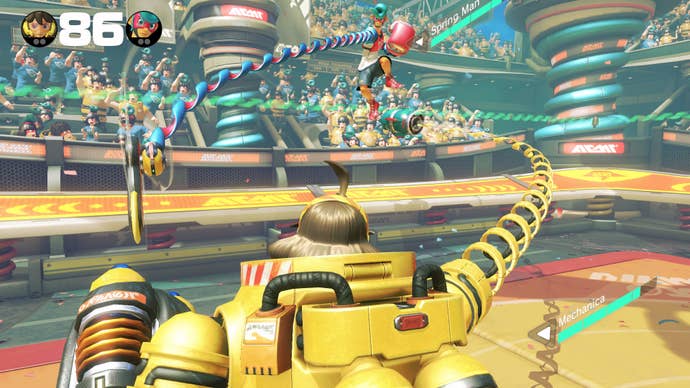
Going from Mario Kart to Arms is a big transition of genres. And that seems to be a trend for Nintendo, to take a well-trodden genre and make it really different and livelier, in a way. Can you talk about that process of refreshing old, staple genres?
Kosuke Yabuki: One thing is that I think it's really an amazing thing if you can make something that doesn't fit into an existing genre, or people don't even know what to call it right away. I think that's an amazing thing. But rather than just trying to take something and build it up from scratch, there's also lots of different approaches you can do where you do take something that's an existing, established genre or game idea, and then using new technology or maybe just the new kind of atmosphere you're in now, and try and build something new based on that. Coming at it from an angle I think is an interesting way to do that.
For my part, when I was a kid, I was a really big Street Fighter 2 player. I loved playing that game and obviously at that time you had these side view games that you could only play with everyone looking at the same screen. And now, obviously, you can play games online and you can use motion controls. There's all these different technological things that allow you to really construct the game in a very different way.
I think if you look at Mario Kart, that's something that kind of has the same amount of history as the Street Fighter series, and it's something that's had to change as time has gone by in a similar way. But Arms is something that is being made right now based on the technology and the ways of making games we have now. And one thing, I don't want anyone to get the wrong idea [about] is, I'm not saying Street Fighter is like tired or old or anything like that. It's a serious type of game I really respect. Our process for Arms was really [just] how do we take those kind of established elements and how do we rethink them and build something out of that.
We're coming up on the one year anniversary in a few months from now. What have been like the biggest challenges the team's faced in regards to all the content updates and the new Party Crash mode and other things added?
KY: You know, it's hard for me to pick one and single it out because I think what we were going for by adding the Party Crash mode and adding different fighters or adding like collectible badges, the aim and attention of all those things is quite different. I think the big challenge really was looking at these updates, trying to update the game from multiple different directions, and just making it overall more and more fun. And if there's people who had played Arms a bit and quit Arms, then maybe we could bring them back. Maybe we could attract new people [who] hadn't been into it before at all and just kind of overall trying to make sure the game keeps leveling up. I think was the big thing for us.
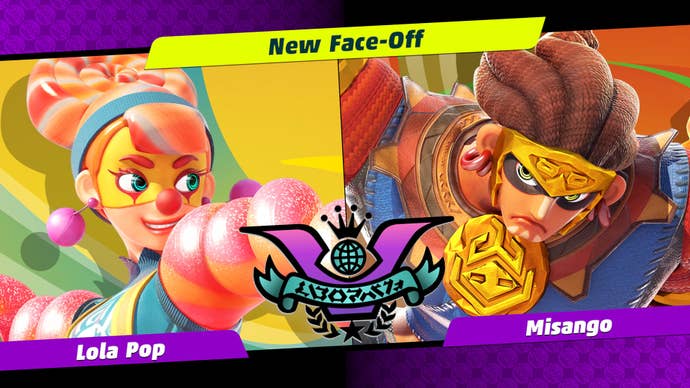
I mean, if I could point out one thing that's pretty tough for us, [it's] the idea of releasing a game and then continuing to support it post-release. That's, for my part I think, something we're not super used to yet [and] it's something that's new for us. So one challenge I could point to was both for myself and my team, like us having to change our way of thinking about how we handle a game post-release. But once we started that process and we started getting all this feedback from users and started thinking about, 'Okay, we could add all these different things to be fun.' [Then] that whole process became very fun as well.
And I think that's something that we're really able to do because of where the games industry now is, where games are because we're in this modern time that we're able to keep updating the game and powering it up. And, of course, we can't just only support the games we've already released, we have to also be working on new games and like figuring out that time management thing for me right now is a big question.
This is more of a silly question I guess, but who's your favorite fighter and arms combination?
KY: So if we're talking about just who I've played the most for a character, I'd say it's Spring Man for sure. The standard Spring Man with the two toasters is actually, just in terms of numbers, that's probably the set up I play with the most. It's very ingrained in me at this point.
And then talking about maybe just purely from like a favorite standpoint, I would say Min Min as well. I've said that quite a few times I think in interviews when I get asked that too, usually Min Min. I think part of that, kind of the joke answer to why Min Min is because I really like ramen. But maybe the game-related reason is also with her left arm being able to power up into that bigger dragon arm. She has aspects that other characters don't have.
Can I ask you what character you like?
Oh, I like Twintelle.
KY: She's one fighter, I think even [with the] others, that we feel really glad that we made her. Obviously being Japanese and working on games in Japan, when we're trying to create characters for the game and thinking about like, 'All right, well what will people around the world who are from different countries, different backgrounds, what kind of characters will they like?' It's something we worry about a lot, but obviously being Japanese and of really knowing Japan very well, it's something that is kind of hard for us to [do].
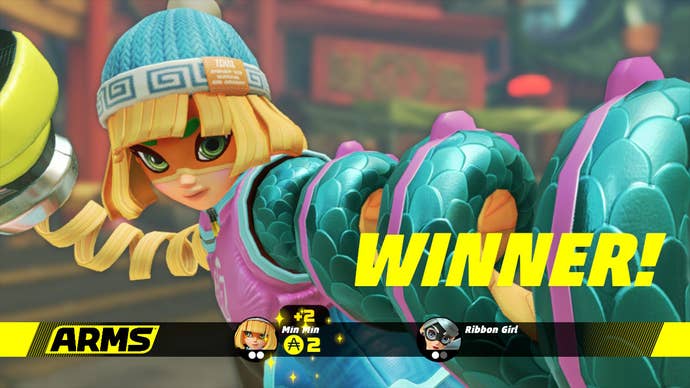
If it's like a question of making a ninja character or something, that's something we feel really comfortable with, we know ninjas really well. I mean obviously Ninjara isn't just like a standard ninja or anything, but in terms of taking this base idea and customizing [it] in different ways, that's something we feel like we're good at it, we feel very comfortable with. When working on a character like Twintelle, we had to talk a lot with a Nintendo of America and Nintendo of Europe and send them sketches and things like that, and get opinions from them. And since there's the process of getting lots of opinions from lots of different people, in terms of the time it took us to solidify like Ninjara and the time it took us to create and solidify Twintelle, just in terms of the number of trials that [started as] ideas. It's like a very different story.
But at the end of that, I'm very happy that we were able to create this very strong female character in Twintelle that people around the world really like, and so I feel really good about that. I think for at least in my opinion, for Nintendo, I feel like we created something pretty new for us with Twintelle and making that kind of fighter. And I felt just as someone who had a part in making that, I felt really good about the reaction to [her]. And seeing all the fanart that's come in, it's been really inspiring, given us a lot of energy. And just again, as a developer sitting here and hearing you say that you like Twintelle, that again makes me feel really happy. So thanks.
While there is 1-2 Switch, it still feels like Arms was the first Switch game to really utilize the Joycons, the motion controls, and the hardware. So what was it like to develop for this very unique console for a new launch-year IP that really utilized the console's potential?
KY: As I was talking about in the presentation yesterday [at GDC], absolutely at Nintendo we make lots and lots of different prototypes and the process by which those become real games, a lot of that has to do with timing, like where we are in terms of where different technologies are and things like that. There's a lot of different timing that has to line up. So when we were making [the Arms] prototype, we were realizing that it worked really well with the prototype Joycons. In looking at that and figuring out when we thought the Switch was probably going to be ready for release, that's what made us kick into gear and decide, 'Okay, we're going to try and get this ready so that it's ready for the Switch.' It might have been ideal for it to be closer to the launch, but since there was also Zelda coming out and 1-2 Switch as well, we thought, 'Well okay, we'll just have a little bit more of an interval and have it come out a little later.'
What will people around the world who are from different countries, different backgrounds, what kind of characters will they like?
It's not even been a year for Arms, and there have already been so many big changes to the game. What's next for Arms in the next year and even beyond that?
KY: The very next thing is at the end of this month, there's going to be that online tournament in North America. [Editor's note: This interview was conducted in late March.] Since it's been about a year since Arms has come out, we've seen lots of strong players really come out, who are kind of making a name for themselves and so this is trying to give them a chance to show off what they can do with the game. And this is something we've already had some success with in Japan. This is kind of us taking it, [and] saying, 'Okay, can we have similar things like this in North America as well?' Because of the issue of America being such a big territory [compared to Japan being a smaller country], personally, I'm a little nervous about it.
But for me, one of my expectations is hopefully we, with this online tournament, demonstrate that it's possible to have these good online matches with people who are very far away from each other, and maybe that'll draw more people into the game. But, you know, things like an online tournament of course end up being for people who, if you imagine that there's a pyramid of like Arms ability and Arms skill, it ends up being for people at the top. Obviously we don't want to focus just on those people.
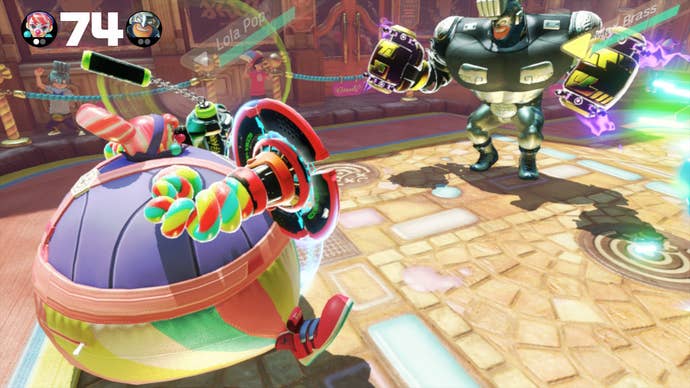
For all those people who haven't reached the top of the pyramid yet but maybe play the game a bit and kinda want to jump back into it, we have these Party Crash events. So I think going forward that's like a big part of it is to make sure the game is fun for people no matter how they're engaging with the game. I think if the base that are on the skill pyramid can get bigger and bigger then more and more people have a chance to reach the top as well.
And obviously it's not just for North America either, because next month the game is actually going to come out in Korea. So [we] want to keep making it so that more and more people around the world have an opportunity to try out Arms and get involved with it.
And I'm in charge of Mario Kart and Arms, so I would say I really love competitive games and obviously the thing about competitive games, it's like the more users you have, the more matches you can have, the more people keep playing it. So I think it's very important that we keep getting new people in the games to make sure the game has a long lifespan. And so, [as long as there's] the competition, and also just the interaction with people playing the game continues to be fun, I want to keep supporting the game and keep updating it.


